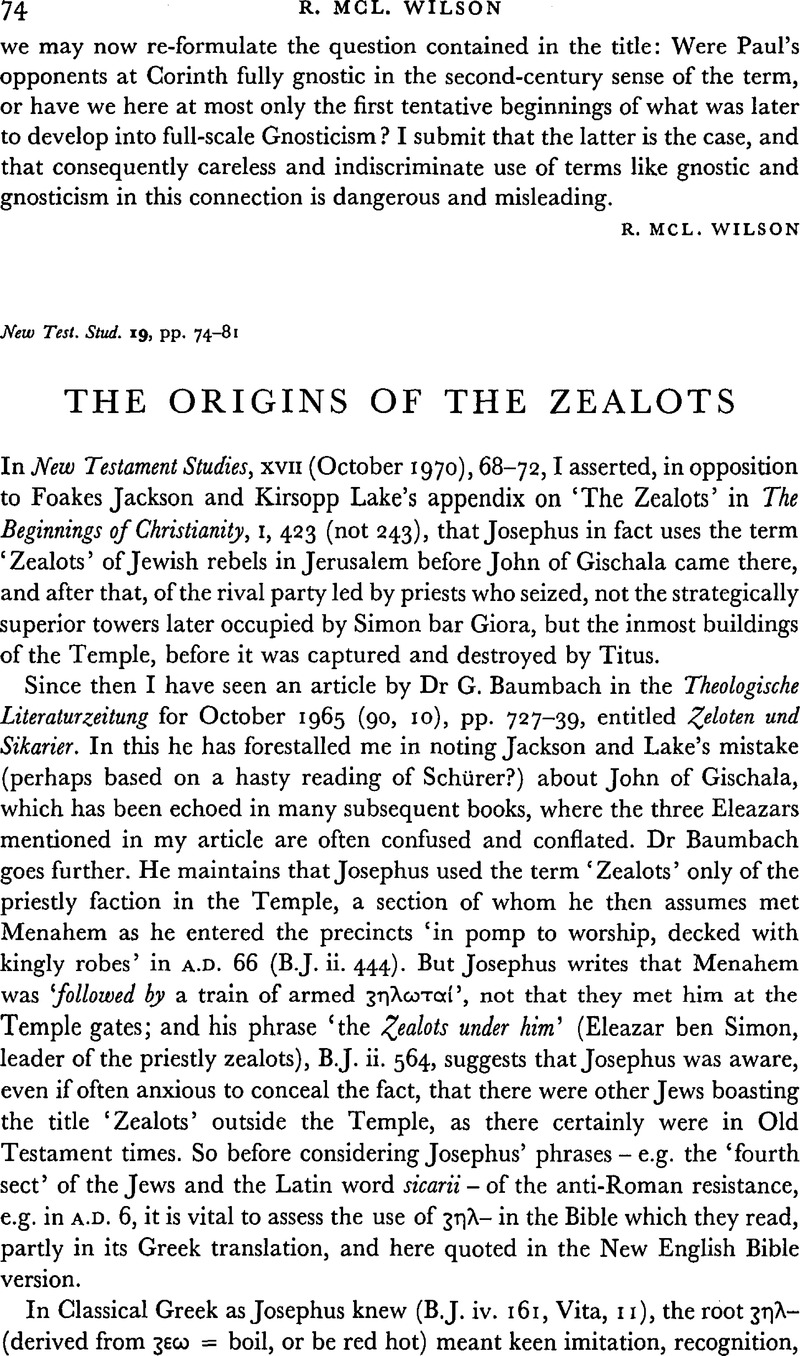Article contents
The Origins of the Zealots
Published online by Cambridge University Press: 05 February 2009
Abstract

- Type
- Short Studies
- Information
- Copyright
- Copyright © Cambridge University Press 1972
References
page 75 note 1 References in Stumpff, A., Art. ξηῆλος in T.W.N.T. II, 879 ff.Google Scholar (E.T. 877 ff.), to which these paragraphs are much indebted: also Hengel, M., Die Zeloten, pp. 151 ff.Google Scholar
page 75 note 2 See Küchler, F., ‘Der Gedanke des Eifers Jahwes im A.T.’ (Z.A.W. XXVIII (1908), 42 ff.)Google Scholar cited in Stumpff, and Hengel, op. cit.
page 75 note 3 Op. cit. p. 152 n. 6.
page 76 note 1 Hengel, op. cit. p. 153, n. 2. Cf. Bauernfeind, , Art. πόλεμος in T.W.N.T. VI, 507 ff.Google Scholar (E.T. VI, 502 ff.) which summarizes the work of G. von Rad, Der heilige Krieg im alten Israel.
page 77 note 1 Op. cit. p. 887 and n. 16.
page 78 note 1 Reporting the world-domination dream in Daniel II, and implying that the fourth empire was Rome, he adds: ‘Daniel also showed the king the meaning of the stone, but I have not thought it right to relate this, as it is my task to record the past, not the future; but anyone who…is such a busybody as to wish to know about the obscure things of the future should stir himself to read the book of Daniel’ (A. x. 210). He can hardly have expected many readers to do this; in, for example, B.J. VI, 285, he stigmatizes prophecies promising the Jews σωτηρία as false.
page 78 note 2 N.T.S. XVII, 70 and n. 2.Google Scholar
page 78 note 3 Presumably referring to Zech. ix. 9f., Ps. lxxviii. 8; cf. Ps. cxi. 1, 5f. etc.
page 79 note 1 ii, 444.
page 79 note 2 A. xviii. 9.
page 80 note 1 This surely shows decisively that the census Judas was the same as Ezekias' son who attacked the palace at Sepphoris.
page 80 note 2 Gal. i. 14. Cf. the help that Sadok the Pharisee gave to Judas of Galilee, suggesting that a wing of the Pharisees was close to him.
page 80 note 3 Op. cit. pp. 50 and n. 8, 94 and nn. 2 and 3, referring also to B.J. vii. 410, 418. Hengel follows Josephus in claiming that Judas of Galilee introduced a radically new note into the polity of the Jews, long used to foreign domination. But the Hasmonaeans had inherited sovereignty and θεοκραται from the Maccabees, whose guerrilla warfare had proved more effective before the Romans had improved the roads and harbours and brought up greater forces.
page 81 note 1 See Albrecht Noth, Heiliger Krieg und heiliger Kampf in Islam und Christentum.
- 4
- Cited by


